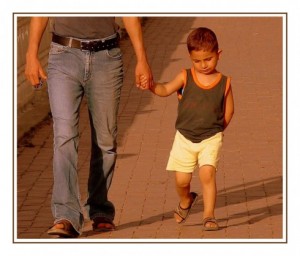I’m writing this on Father’s Day. My daughter, age 26, called me from the east coast where she is engaged in a graduate program summer internship. My 19 year-old son called on a borrowed cell phone because he hasn’t paid his phone bill for the past 3 months. It would be easy to look at the obvious and decide to be proud of one and disappointed with the other. But as parents, we know there’s more to it than that. They are different kids, different ages, and they bring such different things to the table. Given the circumstances which go way beyond the obvious, I can’t imagine being more proud of each one. With each of my kids I have had moments of feeling like a total failure as a parent. I’ve had far more moments of speechless gratitude and breath-taking respect for each of them.
“Bring up a child in the way he should go,” is still an important proverb, but the conclusion, “and when he is old he will not depart from it” is no longer a given. When this was written, communities were more religiously and culturally homogeneous. Intergenerational families lived in the same town or even in the same house, and friends lived as neighbors through their whole life. Religion, education, and family history were intertwined in the normal course of life, and kids could rarely escape the eyes and ears of all those corrective influences.
Such is not the case today. Our society is mobile and diverse, and children are influenced daily in ways unimaginable just a generation ago. More and more of their lives beyond the age of 12 are lived outside the awareness of parents. The internet is just one example of the many ways children and teens can access information and engage in relationships and activities that may be completely independent of their family, school, and church life.
This and many other influences make parenting a more important and a more difficult job than ever before. We are bombarded with advice from parenting experts through books, newspaper articles, and television shows, but there are few clear guidelines for how to prepare our kids for experiences that will undoubtedly be far beyond their maturity level. In the face of all this, there are no perfect parents. All we can strive for as parents are the patience, persistence, daring, and good humor to be a “good-enough” parent.
 Mark Twain once observed that “at the age of 12 a boy starts imitating a man, and he just goes on doing that for the rest of his life.” There are a great many men, myself included, who have a sense of merely imitating what it means to be a man, and a father. We know we’re making it up as we go, bluffing much of the time. Yet, we live and work in a culture that promotes the idea that we should know what we’re doing, we should be certain and confident, and we should be capable of rising to any demand. Consequently, there’s little room for admitting we don’t know, we’re not sure, we make mistakes, we get scared. There are no perfect fathers, or mothers.
Mark Twain once observed that “at the age of 12 a boy starts imitating a man, and he just goes on doing that for the rest of his life.” There are a great many men, myself included, who have a sense of merely imitating what it means to be a man, and a father. We know we’re making it up as we go, bluffing much of the time. Yet, we live and work in a culture that promotes the idea that we should know what we’re doing, we should be certain and confident, and we should be capable of rising to any demand. Consequently, there’s little room for admitting we don’t know, we’re not sure, we make mistakes, we get scared. There are no perfect fathers, or mothers.
I believe that in striving to be a “good enough” parent, sometimes the best we can do is make sure our intentions are visible in our actions. What I hope for my children is that they possess an inquisitive mind, a tender heart, a strong moral intuition, a sense of personal responsibility, and the capacity to endure disappointment. If that’s what I want for them, I need to make sure they see those qualities in me, consistently, daily, over the course of years through all the normal, routine activities of family living and growing up.
0 Comments until now
Add your Comment!